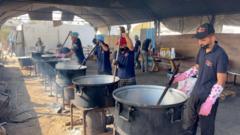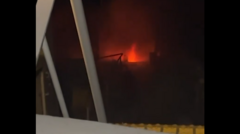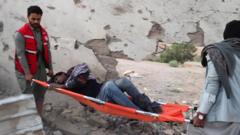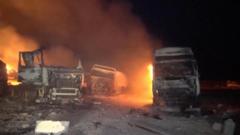Gaza's community kitchens are on the brink as a prolonged Israeli blockade starves local families, with humanitarian organizations warning of an impending crisis.
**Gaza's Community Kitchens Face Inevitable Food Shortages Amid Ongoing Blockade**

**Gaza's Community Kitchens Face Inevitable Food Shortages Amid Ongoing Blockade**
Food supplies dwindle in Gaza's kitchens as international calls grow to end the blockade.
In the heart of Khan Younis, Gaza, the community kitchen operated by the American Near East Refugee Aid (Anera) serves a daily meal to around 6,000 people, a crucial resource in a region struggling for sustenance amidst a relentless blockade. The kitchen's only meal for today is koshari—a dish made from rice, lentils, and tomato sauce—delivered to famished families using donkey carts.
According to Sami Matar, who oversees Anera's operations, the community kitchens have become a lifeline for many as local markets are stripped of food. "With no source of income, people depend entirely on our provided meals; there is virtually nothing left in local shops," he states, lamenting the lack of protein and fresh produce due to the blockade.
The blockade began two months ago when Israel shut all crossings, ceasing the entry of food, fuel, and medical supplies. It was accompanied by a resumption of military actions after a ceasefire with Hamas, a situation aimed at compelling the release of hostages held by the group. The UN's World Food Programme and UNRWA have announced the depletion of their food stocks, further intensifying fears of a humanitarian disaster.
United Nations humanitarian chief Tom Fletcher has publicly condemned the use of aid as a bargaining tool, arguing that civilians should never be penalized in such disputes. Amid mounting international pressure to lift the blockade, Fletcher stated, "The blockade inflicts collective punishment; it kills."
Currently, hundreds of thousands of Gazans are reliant on a limited number of community kitchens for survival. Without the blockade being lifted, Anera's distribution efforts could come to a halt, as all food reserves accrued during earlier ceasefires have now been exhausted. "We have no food left," Matar reveals, stressing that only a few weeks of supplies remain.
As stated by several displaced families, the struggles are compounded by soaring food prices and a lack of basic cooking supplies. One mother detailed her daily challenges, explaining how she has resorted to scavenging leaves to fuel fires for cooking due to the absence of gas and food.
Since conflict erupted over 18 months ago, more than 52,000 people in Gaza have been reported killed—largely women and children—as military efforts intensify. The UN warns the humanitarian landscape is the worst it's been due to the blockade, with over 90% of the population displaced.
Despite ongoing international pressure, including a recent plea from US President Donald Trump to Israeli Prime Minister Benjamin Netanyahu to improve conditions in Gaza, Israel's foreign ministry has dismissed criticisms of the blockade and maintained that ample aid is still reaching the territory.
As children gather around the Anera workers in al-Mawasi, the conditions remain dire, with acute malnutrition alarms especially for younger residents. Matar has urgently called for the reopening of the crossings, stating, "If our supplies run out, I don’t know what will happen to the people we support. We are counting on the world to help us reopen the crossings—it’s a matter of survival."



















